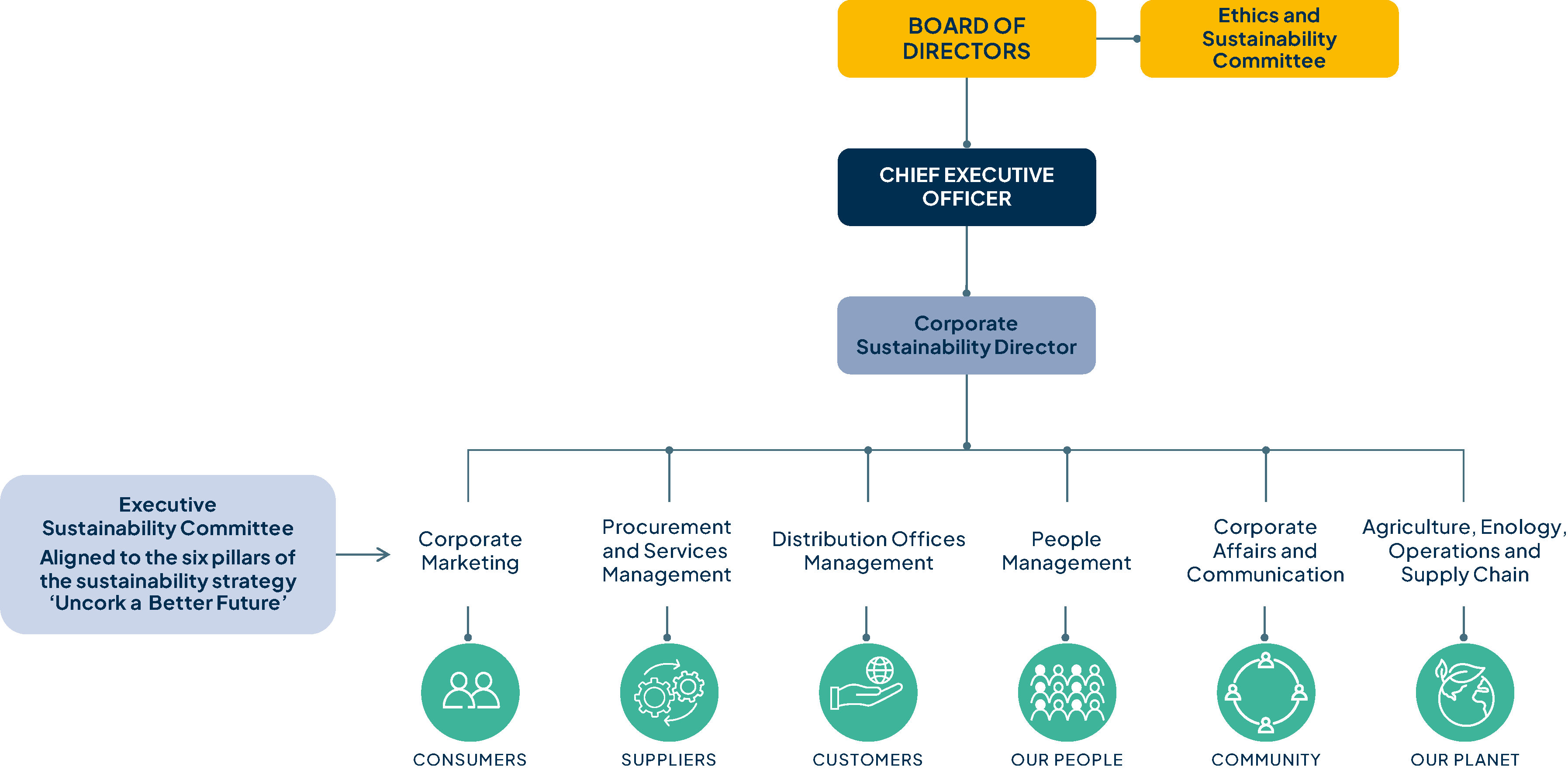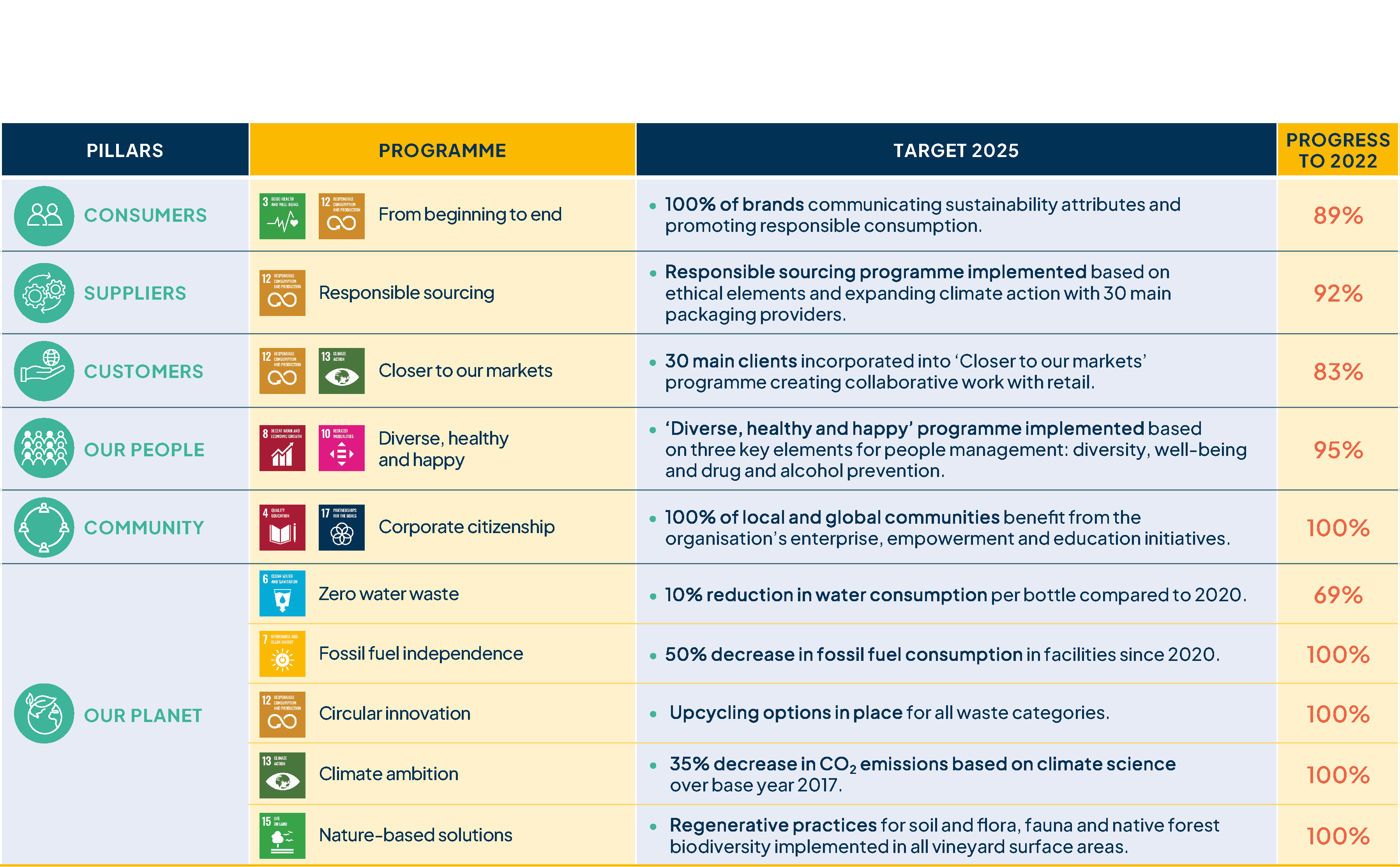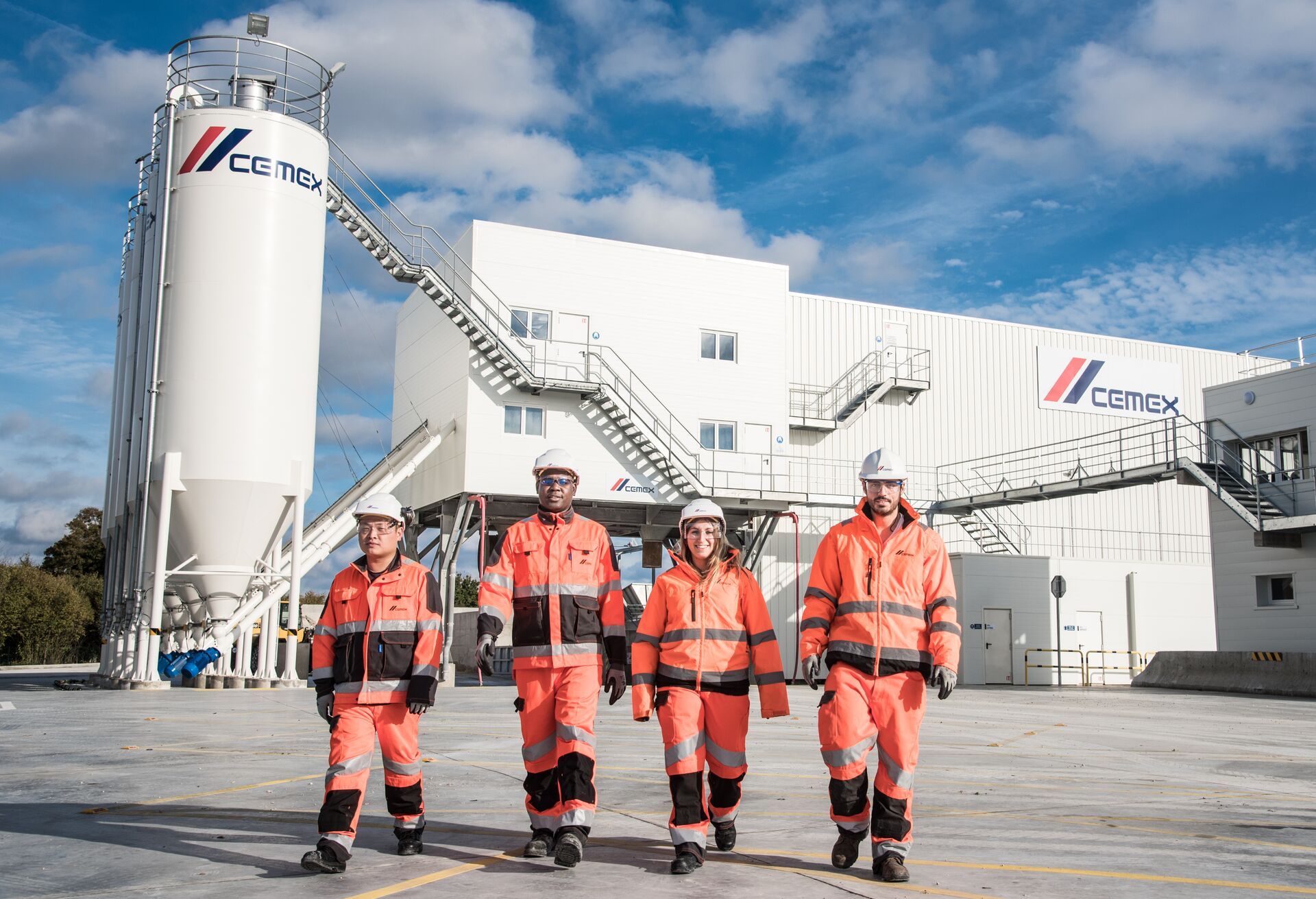Introduction
A leading wine producer, in 2021, Viña Concha y Toro became the first publicly-listed company in Chile to achieve B Corporation (B Corp) status. The organisation focuses on giving as much back to people and the planet as the planet gives to the taste and quality of its wines.
Company information
Viña Concha y Toro is Latin America’s leading wine producer, selling over 30 million cases annually. Headquartered in Santiago, Chile and listed on the Santiago Stock Exchange, it owns 12,000 hectares of vineyards, wineries, and packaging plants across Chile, Argentina and the United States. It has sales offices in 13 countries and exports wines to over 130 countries worldwide.
The board of directors is responsible for reviewing and approving each five-year sustainability plan. The current plan was approved in 2021 and covers the period up to the end of 2025. Following approval, the board actively monitors progress against targets set out in the sustainability plan. It also ensures the organisation achieves its goals, approving any changes to the plan or targets, based on actual performance.
The board is advised by the Executive Sustainability Committee, which provides updates at least twice a year on the organisation’s sustainability progress and proposes new initiatives. The Committee comprises the CEO as President of the Committee, and heads of key functions, each representing one of the six pillars in Viña Concha y Toro’s sustainability strategy. For example, the Head of Procurement is responsible for the supplier pillar, while the Head of Marketing represents consumers.
Sustainability is a standing agenda item at all board meetings. However, it has proven to be difficult to explore issues to the required depth within the scope of general board meetings, especially given the extent of the organisation’s sustainability commitment and the breadth of its targets. Consequently, the board has recently decided to create a new board-level Ethics and Sustainability Committee that, from 2024, will focus specifically on promoting sustainability action and ensuring performance against the company’s sustainability strategy.

Figure 1. Viña Concha y Toro’s sustainability governance structure
The challenge
Viña Concha y Toro’s products are highly dependent on climate and nature. The characteristics of a wine are intrinsically linked to terroir, or the soil in the area where it is produced, while extreme weather events can dramatically affect growing conditions and harvests. Consequently, the organisation actively considers the impact of its operations on climate and nature and the risks that climate change poses to its business activities.
A major challenge for Viña Concha y Toro is reducing its supply chain (scope 3) emissions, which account for 83% of its total emissions. This includes emissions from packaging materials, product distribution and sourcing of grapes. The organisation continuously engages with more than 4,000 suppliers on sustainable business practices to deliver its net zero ambitions, supporting them with knowledge and tools to track emissions. Moreover, the size and geographical reach of Viña Concha y Toro make it challenging to centralise sustainability standards across the company whilst ensuring the delivery of high-quality wine to over 130 countries.
The solution
Clear direction
Viña Concha y Toro started its sustainability journey in 2011 and published its first sustainability strategy in 2012, which has been subsequently revised and updated. The most recent plan – Uncork a Better Future – covers the period up to 2025.
The organisation’s sustainability strategy is defined by regenerating nature and positively impacting stakeholders. It features six pillars, each representing Viña Concha y Toro’s major stakeholders, supported by ten programmes that align with the United Nations Sustainable Development Goals and the UN Global Compact Principles. Each sustainability pillar has quantifiable goals. Given the importance of nature to the business, half of the programmes and goals fall under the pillar of ‘Our Planet’. These range from reducing waste to cutting water consumption and regenerating nature.

Figure 2. Viña Concha y Toro’s sustainability strategy: Uncork a Better Future
A comprehensive framework for decisions
Successful delivery of Viña Concha y Toro’s sustainability strategy requires environmental and social issues to be integrated into strategic decision-making. The board worked with the organisation’s Sustainability Division to create a framework that would build these considerations into all business plans and investment proposals.
The scale of the analysis should align with the magnitude of the project and be supported by quantitative data, whilst recognising that often only qualitative information is available when measuring environmental and social impacts. The analysis should assess any additional costs associated with taking a more sustainable approach, any cost-savings or commercial benefits, and the environmental and social impacts.
Access to comprehensive sustainability information allows the board to have an informed and balanced discussion about a proposal before deciding whether to approve it. The strength of Viña Concha y Toro’s sustainability commitment is demonstrated by the board’s willingness to approve projects at a higher cost, because they deliver greater environmental or social benefits.
Viña Concha y Toro also has its own internal carbon fund. Whilst the sums involved are relatively small, the CEO was keen to implement carbon pricing within the organisation to ensure that climate and environment are given the same consideration in decision-making across the business as they are at the board level.
Externally validated targets
Viña Concha y Toro has had a net zero commitment in place since 2019, which is validated by the Science-Based Targets initiative (SBTi). The organisation regards fully validated emissions reduction targets as fundamental. The board wanted to demonstrate meaningful steps to reduce emissions and address climate change. As part of this action, over the past decade, the organisation has transitioned its operations to run entirely on renewable energy.
Viña Concha y Toro must also work closely with its suppliers to reduce scope 3 emissions. The SBTi approach provides a common framework: all parties use the same methodology, emissions metrics, and technical language, making it easier to monitor and deliver emissions reductions across the supply chain.
Since Viña Concha y Toro first had its targets validated in 2019, the company has made fast and significant progress in reducing emissions, prompting the Sustainability Division to propose bringing forward the organisation’s net-zero target date.
As the board had been monitoring progress closely, it was open to accelerating its corporate climate strategy. In line with the agreed decision-making framework, the Sustainability Division presented detailed analyses to the board to demonstrate that, not only would net zero be possible 10 years earlier than planned, but it could also be delivered with no additional cost to the business.
This was approved in mid-2023, leading to the announcement of a new SBTi-validated net-zero target at COP28 in Dubai, in December 2023. The organisation now expects to reach net zero by 2040.
Embedding stakeholder governance
In 2021, Viña Concha y Toro became the first publicly-listed company in Chile to achieve B Corporation status. The organisation wanted to demonstrate that commitment to, and ongoing improvement in the management of, environmental, social and corporate governance issues is fundamental to its strategy. Approval of B Corp status provides third-party validation of the organisation’s progress to date and encourages continuous improvement.
The board was heavily involved from the outset. Before applying to B Lab for accreditation, Viña Concha y Toro conducted an internal review of its operations against the B Corp benchmark. This was scrutinised by the board, which gave approval to apply formally for B Corp status once it was convinced that the company had surpassed the 80-point threshold required for accreditation. Viña Concha y Toro achieved 81.4 points in the formal review.
Accreditation requires a company to change its Articles of Association and incorporate a commitment to consider its impact on all stakeholders in its decision-making. This shapes how the board approaches its responsibilities. Whilst it can be a significant change for some companies to their operating model, for Viña Concha y Toro it represented an evolution of existing practices. As a signatory to the UN Global Compact and other similar frameworks, the organisation already considered its stakeholders in decision-making.
The organisation believes that embedding such stakeholder governance will be transformative in the long term. Viña Concha y Toro currently has every intention to reapply for, and retain, its B Corp status. However, if that accreditation were to lapse, the requirement to consider all stakeholders would still be embedded into the organisation’s values and guide its business approach.
Progress and impact
From 2018 to the end of 2022, Viña Concha y Toro reduced its direct and indirect carbon emissions (scopes 1, 2 and 3) by 35%. This brings the holding company’s carbon footprint down to less than half of the industry average according to data from the International Wineries for Climate Action (IWCA). To 2022, Viña Concha y Toro made significant progress to the targets set in Uncork a Better Future (Figure 2). Throughout the years, the board has scrutinised the organisation’s progress against these targets and the overall strategy at board meetings, providing guidance on tackling challenges and delivering transparent reporting.
Conclusion
Board-level scrutiny of operational decisions and investment plans has helped to ensure that Viña Concha y Toro is executing its Uncork a Better Future strategy, while delivering consistent revenue growth. The creation of a new board-level Sustainability and Ethics Committee will ensure ongoing improvement in future years, in line with its commitment as a registered B Corp. Significant reductions in direct and indirect greenhouse gas emissions have enabled the organisation to bring forward its net-zero target by ten years to 2040.


